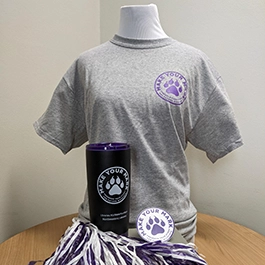Appraisal Tips
What is appraisal?
Appraisal (n) - the process of determining whether records and other materials have permanent (archival) value
Your records tell a story. Think of the various records you create as storytellers of your group's history. To begin telling your story, consider questions like:
- What sets our group apart from others?
- What impact has our group had on Northwestern University and our fellow students/members?
- What has changed for our group over the years?
- What is my group trying to accomplish this year?
Then consider what records document the answers to those questions. That's your story!
Selecting what files to keep and ultimately transfer to the Archives is your decision, and it's an important one because what you select will ultimately tell the story of your organization as it exists today. So when appraising your files, consider what is absolutely necessary to tell that story but remember you can't (nor should you) save everything. Be mindful!
Be especially aware of:
- Duplicative information (one copy is plenty!).
- Anything that may jeopardize the privacy of your fellow residents or members.
- Always consider having photographed or filmed subjects sign a waiver before archiving them. Northwestern University's Office of Global Marketing and Communication has offered templates: Photograph Release Form and Multimedia Release Form.
Digital Citizenship Tips
What is Digital Citizenship?
Digital Citizenship is the practice of using computers, the Web and digital devices responsibly. The majority of records created today are born-digital, and when you donate your records to the Archives it's important to keep digital citizenship principles in mind.
Archival Digital Citizenship
Because digital records are at risk of being misused, altered or even hacked, we practice digital preservation techniques that help prevent these risks once records are sent to the Archives. However, privacy concerns with digital records can be addressed at creation and prior to donation as well.
If you are donating materials for an organization, such as a student group or residential college, ask questions such as:
- Do we need individuals' permission to photograph, audio record and/or video record them?
- Do our records contain personally identifiable information (PII) that needs to be protected? (e.g., addresses, class schedules, social security numbers, transcripts, etc.)
- Who currently has access to our data (e.g., shared cloud drive) and can alter, edit or delete files?
Appraisal Assists Digital Citizenship
Perhaps your materials contain something you think is important—maybe it could even be considered controversial— but you’re worried about protecting the privacy of everyone involved. You can take some steps to help protect privacy. Talk to others in your organization and appraise your records.
Assess the risks:
- Whose privacy may be at risk?
- How long might the risk exist?
- Determine whether donated records should have access restrictions, use restrictions, and/or redactions
Work with the archivists to document these issues and create plans for preservation and access.
Privacy Options
There are many different ways and combinations of ways to protect privacy after records are donated. Below are a few options:
- Access restriction: define who can/cannot access the records now or for a period of time
- Use restriction: limit what can be done with the materials when they are accessed—that is, prohibiting copies from being made
- Redaction: identify what sensitive information in a document should be concealed (e.g., names, addresses)
Digital Preservation Tips
What is Digital Preservation?
Digital preservation is more than just saving data online or on your computer. All hardware and software will eventually fail. Therefore, we use a combination of policies, strategies and actions to help preserve digital files.
Some steps include:
- Virus and malware checking and quarantining
- Migrating files to new formats upon file format and/or software obsolescence
- Saving multiple copies of the files on multiple servers
- Patching corrupted, saved data with copies made on other servers
- Restricting edit access to files to maintain authenticity
Northwestern Libraries Digital Preservation Policy
Find more information about how Northwestern Libraries practices digital preservation: NUL Digital Preservation Policy
What can I do?
In a library setting, we take additional steps to preserve data for as long as possible. But there are some things you can do before you donate your digital records that will help:
- Maintain a record of your passwords and dates they were last changed
- Back up your data; never rely on only one copy of your files
- Do not rely solely on cloud vendors as your only storage option. These servers are owned and managed by companies — not you! Keep a copy of your data on a external drives or a private server.
- Know who has access to your data, who can edit it, who can delete it, etc.
- Store any physical storage drives (e.g., hard drives, flash drives) in a cool, semi-dry environment
- Transfer copies of data onto new drives every 2-5 years to avoid drive failure
- Keep your files organized and described
- Keep notes on what operating systems, browsers, software, etc. you used to access your files
Web Archiving
Websites can be part of your digital collection too!
Web archiving includes capturing websites, their embedded content, preserving and storing them in a separate repository for future access. Due to the changing nature of websites, web archiving ensures that we preserve information on sites as they evolve. Over time, the regular captures of one site creates a database-like environment where you can view a site's changes.
Select Your Websites
When completing your Description of Gift Form, you'll be asked about which websites should be included or excluded from web archiving.
- Select your sites (this can include social media)
- Note whether there are any permissions required to access the site (e.g., private Facebook group)
- Tell us which URLs to add to your collection
- On a yearly basis, re-assess whether your site(s) should continue being crawled. This could be due to:
- the site is now static and no longer updated
- the subject matter or focus of the site has changed and is no longer relevant
 In 2019, Northwestern University Archives launched a project to help Northwestern undergraduate Residential Colleges and student organizations like yours archive their records as part of their everyday workflow and ultimately deposit them with us for long-term preservation and access. By participating in this project, you:
In 2019, Northwestern University Archives launched a project to help Northwestern undergraduate Residential Colleges and student organizations like yours archive their records as part of their everyday workflow and ultimately deposit them with us for long-term preservation and access. By participating in this project, you: